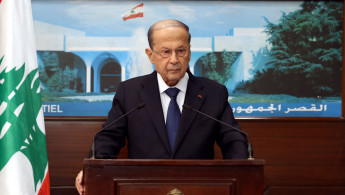Lebanon rules out normalisation ahead of Israel border talks
In a presidential statement released after his meeting with a Lebanese delegation, Aoun reiterated the stance of Beirut - which is technically at war with Israel - and its firm refusal to establish diplomatic relations with its southern neighbor.
"The negotiations are technical and talks should be limited to this particular issue [maritime borders] only," Aoun was quoted by the office of the presidency as saying.
According to local news outlet The Daily Star, Aoun met with UN special coordinator for Lebanon Jan Kubis on the eve of the indirect talks, followed by a meeting with representatives of the Lebanese delegation – Army Commander Joseph Aoun and caretaker Defence Minister Zeina Akar.
During the meeting with the Lebanese delegation, Aoun said the talks aim to reach a decision "that protects the sovereign rights of the Lebanese people".
The first round of talks is set to be held on Wednesday at the UNIFIL headquarters in south Lebanon's Naqoura, with the attendence of US and UN officials.
Read also: The geopolitical race to rebuild Beirut's port
Last Tuesday, the United Nations said that the Lebanese and Israeli negotiators will meet in the same room, but they will not communicate directly. Instead, UN mediators will pass on messages between the relevant parties.
Talks surrounding the maritime border are particularly sensitive due to the possible presence of hydrocarbons in the Eastern Mediterranean.
In 2018, Lebanon signed its first contract for off-shore drilling in two blocks in the Mediterranean for oil and gas with a consortium comprising energy giants Total, ENI and Novatek.
Follow us on Facebook, Twitter and Instagram to stay connected





 Follow the Middle East's top stories in English at The New Arab on Google News
Follow the Middle East's top stories in English at The New Arab on Google News


